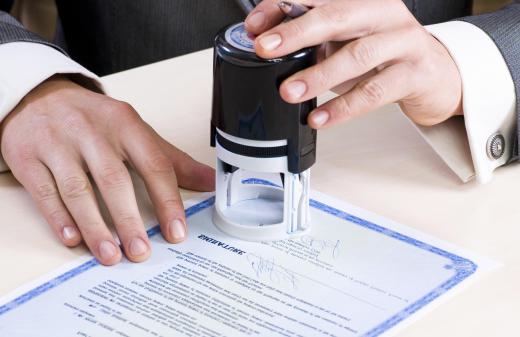At MyLawQuestions, we're committed to delivering accurate, trustworthy information. Our expert-authored content is rigorously fact-checked and sourced from credible authorities. Discover how we uphold the highest standards in providing you with reliable knowledge.
What is a Sworn Statement?
A sworn statement is one that is made under oath, and the person making the statement is swearing that its contents are truthful. It may be in an oral or a written form. This type of statement may be used in various kinds of legal proceedings. The person making the statement understands that they are doing so under penalty of perjury.
Sworn statements may be used in some court proceedings. It is simpler and more efficient for a person to provide evidence in this manner than to appear at a hearing. The court may allow a sworn statement entered into the record as evidence instead.

Alternatively, an individual may appear at the proceeding to provide a sworn statement in person. He or she is required to state that the evidence they are providing is truthful. In the United States, committing perjury is punishable by imprisonment for up to five years. Under Canadian law, the penalty for perjury is a prison sentence of up to 14 years.

An affidavit is another example of a sworn statement. It is a written document signed by an individual, who is known as the deponent. The deponent states his or her full name, address and occupation on the document. The deponent's age may also be included on the affidavit. After this recital, the document lists a series of statements the deponent is declaring are true.

The deponent signs the bottom of the document, which forms his or her sworn statement that the information in the affidavit is true. The document is signed in front of a notary public, and the deponent's name is printed under his or her signature. The notary public also signed the affidavit.
When the sworn statement is in written form, relevant documents may be attached to it. The document being referred to is specifically described in the affidavit and may be called an exhibit. This type of statement may be used to indicate that the document it refers to is authentic.

Another situation where a sworn statement may be required is when a person has been the victim of a crime, such as identity theft or forgery. An affidavit may need to be signed by the victim stating that he or she was not the person who benefited from the forged check or other financial documents. The victim may have to provide this document to receive compensation for his or her loss.
AS FEATURED ON:
AS FEATURED ON:















Discussion Comments
Since perjury is rarely prosecuted, why even have someone sign saying the information is accurate?
@LTmmins - It is understanding that a testimony in a court does constitute a sworn statement. I'm pretty sure that you can be charged with perjury if something you say while testifying is proven to be false. I don't know how often this happens, and it could be that I have just watched too much Law and Order.
@pennywell - It seems to me that many people end up lying while providing a statement on record whether they place their hand upon a holy book or not. Here's a hypothetical situation: instead of a religious-based oath, wouldn't it be more effective to have a person sign a sworn statement or affidavit form, agreeing that they could be imprisoned for perjury? I'd imagine that threat of a very real punishment would be something that is hard to ignore.
@EricRadley - I think it depends on the context. For example, it would be rather useless for an atheist to swear upon a Bible, since it holds no real moral meaning for them. Some oaths do take place with the person simply holding up their left hand while others can choose to place their hand on the Quran, the Bible or another holy book based on their religion. That being said, do you think that it makes sense to continue that tradition in today's age when many people aren't really very religious at all?
It says here that in courtrooms, people have to provide a sworn statement and or risk being punished for perjury. Is that type of sworn statement simply said aloud or do they also have to put their hand on a Bible as part of the procedure?
Post your comments